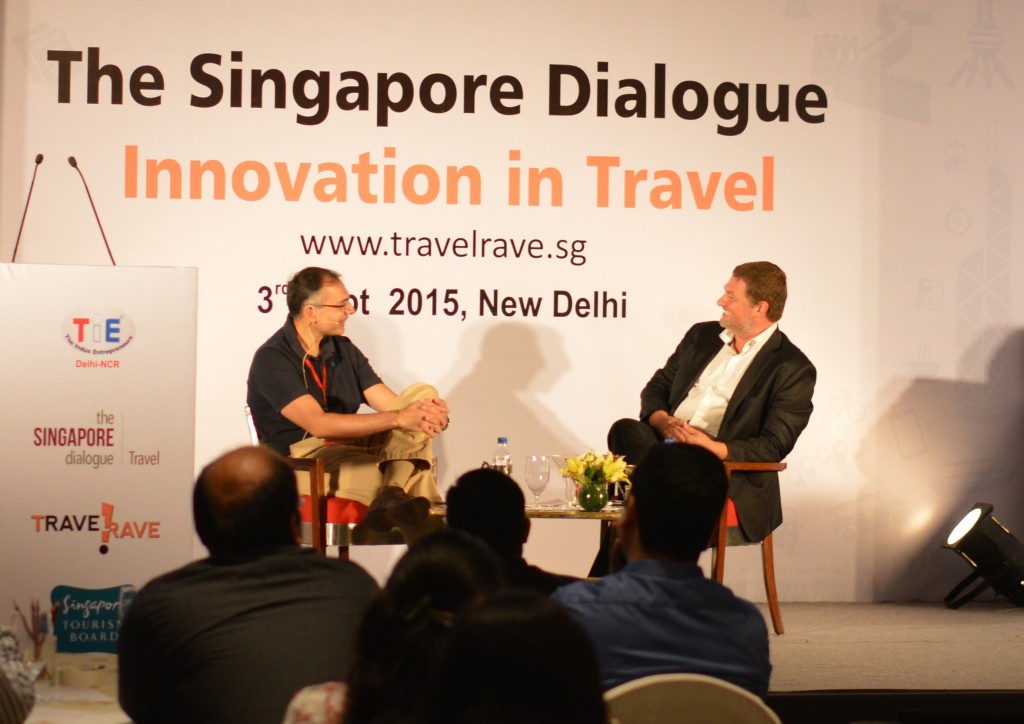With new technologies and innovative startups coming up in travel, we are beginning to see new trends emerge rapidly in the Industry. Singapore has been at the forefront of such innovations and is setting an example of its neighbors including India. To explore such trends in Asia, Singapore Tourism Board brought ‘The Singapore Dialogue- Innovation in Travel’ to India with TiE (Delhi Chapter). The summit brought together representatives from global travel brands, innovative travel startups and industry analysts.

Deep Kalra, CEO, Makemytrip with Bart Bellers, Senior Advisor – Corporate Strategy, Amadeus Asia Pacific
Deep Kalra, Founder & CEO, Makemytrip and Bart Bellers, Senior Advisor- Corporate Strategy, Amadeus Asia Pacific discussed about the new trends that we will see in India and rest of the Asia. Here are the 5 major ones that will define the travel industry in future.
#1. Sharing economy
“We have an unused room in our house. We can rent it through Airbnb and make some extra money” isn’t something you commonly hear in India. According to Deep Kalra, there is a general opinion around peer to peer services that they can’t work in India, but we will be surprised with their growth in future. There will be a surge in number of people who sublet their house to travellers through platforms like Airbnb or lend their cars using something like Getaround to others when it is unused. We have already seen Guesthouser implementing a similar model in India and we will see more such platforms grow big in future.
#2. Mobile first approach
Businesses are going app only not just because it has become a fashion these days. When it comes to the Indian e-commerce industry, we have entirely skipped the desktop generation and jumped straight to mobile phones. Going mobile only is a smart thing to do for many businesses. Location based services like Uber and last minute services like HotelTonight are not suited to desktops. Going forward, we will see more businesses being built around mobile.
The buying power of Tier 2 and Tier 3 cities is strong and vernacular will help brands connect with them in a better way. According to Deep Kalra, people who build products for these cities in their native language will probably end up doing really well.
#3. Augmented reality/ Virtual reality
With almost all the major technology companies working on virtual reality and augmented reality, it won’t be long before it becomes mainstream. While taking a virtual tour on Oculus Rift might not be as good as taking the actual tour, it is a new experience in itself. People can choose to virtually experience the activity before they actually go for it. Google with its Jump project is trying to make virtual reality really affordable and also available for educational purposes. Augmented reality will make a part of navigations systems and virtual tour guides. We will see more innovations in this space going forward.
(Read: Jump!!! Google is taking you on a tour)
#4. Wearables
Apple Watch is surely a cool thing to own right now but it hardly has any strong use case at the moment. Brands are coming up with apps for the quirky gadget and trying to add to its significance but these are still the early days for wearables. We will see an entire ecosystem being developed around wearables and then they will play a much bigger role. They will be used for paying for transactions, navigating at airports, checking flights, unlocking rooms, checking into hotels and lot more. Many new companies will enter the scene catering to the travel industry with wearables.
(Read: Why your travel brand shouldn’t join the wearable race)
#5. Predictive modelling
Since travel is a tech driven industry, we hear the term ‘big data’ all the time. It is just heaps of data collected over time which has been processed to make sense of. Companies will use the data to forecast trends like flight prices, ticket availability and hotel prices. Brands in US are already doing this and now we have the technology and data to do something similar. We recently saw ixigo leverage the data collected over the years to develop PNR predictor which gives a pretty good idea if a waitlisted train ticket will be confirmed or not. More brands will come up with similar innovations to associate with their products and boost customer experience.
We will be publishing more stories and interviews from The Singapore Dialogue in the coming days. You can find them along with the past events under the Events section on our website.



















